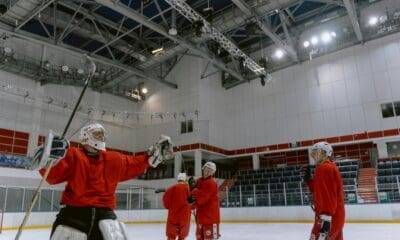The British ice hockey community is mourning the loss of one of its founding fathers, following the news that Les Strongman has passed away in his native Canada at the age of 95. Strongman was one of the founding architects of the Nottingham Panthers and of the entire professional ice hockey scene in the UK. He remained connected with the club well into his senior years.
Founding father
Born in Winnipeg in 1924, Strongman emigrated to Europe at a young age, settling in Nottingham in the immediate post-war years, where he started a family. In 1946, he was part of the “Winnipeg contingent” that formed the backbone of the original Panthers.
Those early seasons were hard, for a host of reasons. The sport was very different to today’s world of sticks with custom curves and fans placing ice hockey bets online and waving at the fancam. Back then, straight sticks were the order of the day, and Strongman, a left hander, played with a stick no different to those of his right handed team mates.
Safety was also a far cry from what we see today, although Strongman was instrumental in making changes in that area. In fact, he went down in history as the first ice hockey player in Britain to wear a helmet, after sustaining a cracked skull on the corner boards at Nottingham’s old stadium.
Nottingham might not have been one of the leading teams back in the 40s and 50s, but Les Strongman and his teammate and compatriot Chick Zamick stood head and shoulders above the rest, and are remembered as true legends of the game.
Later career and retirement
After more than a decade with the Panthers, Les decided on a change of scenery, moving first to the Panthers’ arch-rivals of the day, the Wembley Lions, and then having stints at both Malmo and Zurich, before bringing his 21-year professional career to a close in 1967.
But his heart had never left Nottingham, and he returned there after retirement, running a newsagents shop on Parliament Street, just yards from the ground, for many years. However, his continued connection with the Panthers was more than just through proximity. Les will be remembered by later generations for his passionate and insightful coaching skills and for his hand-on approach.
Former player and current manager Gary Moran remembers how Les was always willing to get back on the ice and turn out for some exhibition play with men young enough to be his grandchildren, even in the 1990s when he was well into his 60s. Moran told the club website “The rest of the team were younger than both of us but he was the best player on the ice.”
After many years in and around the club, both as a coach and committee member, Les decided to move back to Winnipeg to see out his autumn years with his children and grandchildren. He died peacefully on 08 August, and the entire British ice hockey community’s thoughts are with his loved ones.











